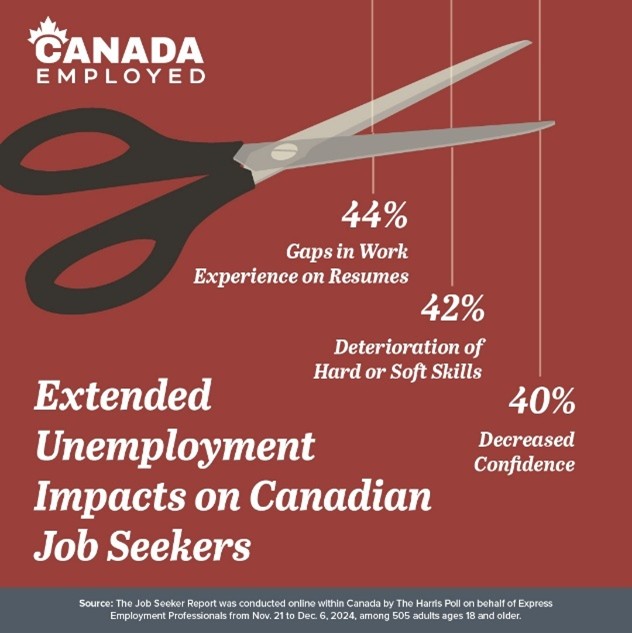
Employers cite lack of applicants with relevant experience: survey

As many employers are letting workers go amid the U.S. tariffs issue, laid-off employees must be equipped to find new jobs to avoid the pitfalls of prolonged unemployment.
Extended joblessness significantly impacts job seekers' skills, confidence, mental health, and networking opportunities, according to a recent survey by Express Employment Professionals.
Among those who have been unemployed for a prolonged period:

“The biggest impact of unemployment I see is on mental health; a lot of job seekers feel deeply frustrated by how hard the process is,” says Brent Pollington, Vancouver Express franchise owner.
“What can be most disheartening is the sheer volume of rejection, especially for people who aren’t in roles where rejection is a regular part of their work. It can feel deeply personal and defeating.”
Finding a job that aligns with their skills (33%) is the top barrier to finding new employment for Canadians, according to a previous report from Robert Half.
Over one-quarter of unemployed job seekers (27%) have been out of work for more than two years, according to Express’ survey of 505 Canadians conducted between Nov. 21 and Dec. 6, 2024.
This is lower than the 38% recorded in the spring and fall of 2023.
Among those who are unemployed, more needed to quit or voluntarily quit (33%) compared with those who were laid off (17%).
Amid the US tariffs, companies like Stellantis, Dell and Siemens have announced mass layoffs. And many more Canadians fear they might lose their job, according to a previous survey from Leger.
Despite the widespread struggle to secure employment, 1 in 3 (32%) Canadian companies report having job vacancies they cannot fill, according to a separate Express survey of 505 Canadian hiring decision-makers conducted between Nov. 11 and 26, 2024.
Employers attribute this struggle to hire to:
Over 3 in 4 (77%) Canadian companies report significant challenges in finding qualified workers, according to a previous ManpowerGroup study.
Two-thirds of companies (66%) say that deterioration of both hard and soft skills is a main impact of being unemployed for an extended period of time, especially for young adults (ages 18-26).
In this context, Pollington suggests that job seekers turn to upskilling.
“The people who stand out in today’s job market aren’t just upskilled — they’re aligned,” Pollington said. “They’ve taken the time to understand what drives employer decisions, what catches attention in a sea of resumes and how to tailor their approach to speak directly to what companies need.”
AI upskilling is now a workplace necessity across industries, according to a previous report from Udemy.
According to Robert Half, it’s important for employers to provide some support to workers who they lay off.
“Offering support to a terminated worker demonstrates compassion and can soften the blow of a layoff.”
For example, “providing an appropriate severance package shows appreciation for a departing employee’s efforts while on staff and helps them transition to their next opportunity,” says Robert Half. “Also, consider arranging for outplacement services that provide laid-off workers with job search training, coaching and resources to help them find a new job more quickly.”
Overall, 83% of Canadian women feel there is a need for more networking opportunities specifically designed for women, according to a previous report.